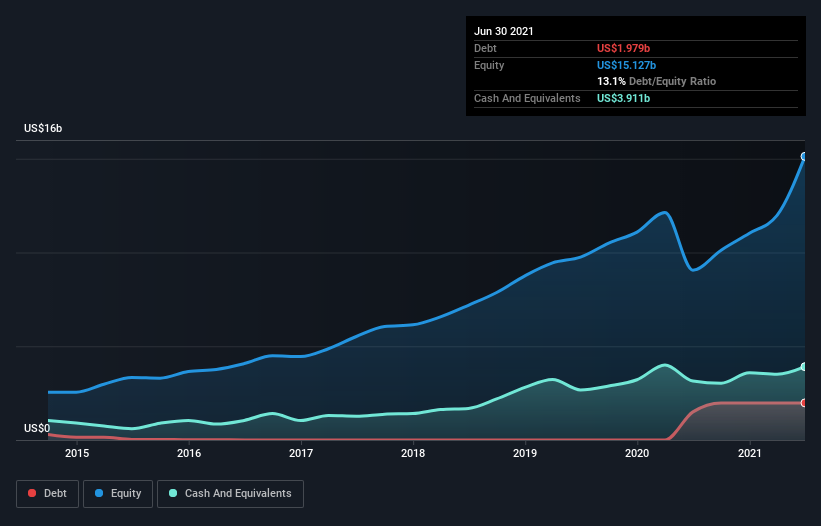Regeneron Pharmaceuticals (NASDAQ:REGN) Seems To Use Debt Rather Sparingly
Warren Buffett famously said, 'Volatility is far from synonymous with risk.' It's only natural to consider a company's balance sheet when you examine how risky it is, since debt is often involved when a business collapses. Importantly, Regeneron Pharmaceuticals, Inc. (NASDAQ:REGN) does carry debt. But the more important question is: how much risk is that debt creating?
What Risk Does Debt Bring?
Generally speaking, debt only becomes a real problem when a company can't easily pay it off, either by raising capital or with its own cash flow. In the worst case scenario, a company can go bankrupt if it cannot pay its creditors. However, a more frequent (but still costly) occurrence is where a company must issue shares at bargain-basement prices, permanently diluting shareholders, just to shore up its balance sheet. Of course, the upside of debt is that it often represents cheap capital, especially when it replaces dilution in a company with the ability to reinvest at high rates of return. The first thing to do when considering how much debt a business uses is to look at its cash and debt together.
See our latest analysis for Regeneron Pharmaceuticals
What Is Regeneron Pharmaceuticals's Debt?
As you can see below, at the end of June 2021, Regeneron Pharmaceuticals had US$1.98b of debt, up from US$1.50b a year ago. Click the image for more detail. But on the other hand it also has US$3.91b in cash, leading to a US$1.93b net cash position.
How Strong Is Regeneron Pharmaceuticals' Balance Sheet?
Zooming in on the latest balance sheet data, we can see that Regeneron Pharmaceuticals had liabilities of US$3.73b due within 12 months and liabilities of US$2.63b due beyond that. Offsetting this, it had US$3.91b in cash and US$7.00b in receivables that were due within 12 months. So it actually has US$4.55b more liquid assets than total liabilities.
This short term liquidity is a sign that Regeneron Pharmaceuticals could probably pay off its debt with ease, as its balance sheet is far from stretched. Succinctly put, Regeneron Pharmaceuticals boasts net cash, so it's fair to say it does not have a heavy debt load!
Better yet, Regeneron Pharmaceuticals grew its EBIT by 128% last year, which is an impressive improvement. If maintained that growth will make the debt even more manageable in the years ahead. When analysing debt levels, the balance sheet is the obvious place to start. But ultimately the future profitability of the business will decide if Regeneron Pharmaceuticals can strengthen its balance sheet over time. So if you want to see what the professionals think, you might find this free report on analyst profit forecasts to be interesting.
Finally, a business needs free cash flow to pay off debt; accounting profits just don't cut it. Regeneron Pharmaceuticals may have net cash on the balance sheet, but it is still interesting to look at how well the business converts its earnings before interest and tax (EBIT) to free cash flow, because that will influence both its need for, and its capacity to manage debt. Over the most recent three years, Regeneron Pharmaceuticals recorded free cash flow worth 53% of its EBIT, which is around normal, given free cash flow excludes interest and tax. This cold hard cash means it can reduce its debt when it wants to.
Summing up
While it is always sensible to investigate a company's debt, in this case Regeneron Pharmaceuticals has US$1.93b in net cash and a decent-looking balance sheet. And it impressed us with its EBIT growth of 128% over the last year. So we don't think Regeneron Pharmaceuticals's use of debt is risky. When analysing debt levels, the balance sheet is the obvious place to start. However, not all investment risk resides within the balance sheet - far from it. For instance, we've identified 3 warning signs for Regeneron Pharmaceuticals (2 don't sit too well with us) you should be aware of.
Of course, if you're the type of investor who prefers buying stocks without the burden of debt, then don't hesitate to discover our exclusive list of net cash growth stocks, today.
This article by Simply Wall St is general in nature. We provide commentary based on historical data and analyst forecasts only using an unbiased methodology and our articles are not intended to be financial advice. It does not constitute a recommendation to buy or sell any stock, and does not take account of your objectives, or your financial situation. We aim to bring you long-term focused analysis driven by fundamental data. Note that our analysis may not factor in the latest price-sensitive company announcements or qualitative material. Simply Wall St has no position in any stocks mentioned.
Have feedback on this article? Concerned about the content? Get in touch with us directly. Alternatively, email editorial-team (at) simplywallst.com.

 Yahoo Finance
Yahoo Finance 